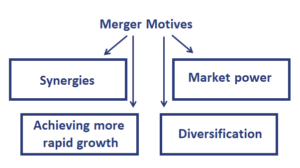Motivations For M&A
CEOs often cite a wide range of motivations for M&A (M&As). Some of these reason are economically founded, while others are not. Investors and shareholders should carefully assess the motivations for a merger. There may be several merger-motives at the same time and the motives may be related.
On this page, we discuss the reasons for mergers and acquisitions. In particular, we discuss what are the main reasons for companies merge or acquire other companies. Most of the reasons are strategic reasons for mergers and acquisitions. We only discuss one reason for acquisitions that does not make economic sense.
Synergies
The main strategic reason for an M&A is to achieve synergies. This means that the combined company is expected to be worth more than the two companies separately. Usually, this is achieved by reducing costs or increasing revenues. Cost synergies are what drives most horizontal mergers. Revenue synergies are typically the result of cross-selling, increased market share, and higher prices because of the reduced competition.
Achieving more rapid growth
Another important reason for mergers and acquisitions is to achieve more growth. Very often, external growth through M&As is easier to obtain than internally generated growth. Growth through M&A activity is especially common in more mature industries. Another reason why this tactic to generate additional growth is often used is because it is less risky than trying to generate growth internally.
Increased market power
A third motive of mergers is to increase market power. A higher market share implies a greater ability to influence market prices. Regulators will often investigate mergers that are motivated solely to increase market power. In particular, regulators will calculate the Herfindahl-Hirschman index to analyze the impact of the merger on market concentration.
Gaining access to unique capabilities
A merger or acquisition may be a cost-effective way of obtaining proven capabilities or knowhow. It is often cheaper to acquire such skills or knowledge rather than trying to develop it internally.
Diversification
Finally, diversification may be another reason for managers to engage in M&A activity. Diversifying the firm’s cash flows makes sense from a managerial perspective. Shareholders, however, do not benefit from this. For shareholders, it is easier and more cost-effective to obtain diversification by buying other companies.
Summary Motivations For M&A
On this page, we discussed motives and benefits of mergers and acquisitions. There are at five possible reasons for mergers. Two merger-motives that we did not discuss in detail because they do not make economic sense are bootstrapping EPS and personal benefits for managers.

